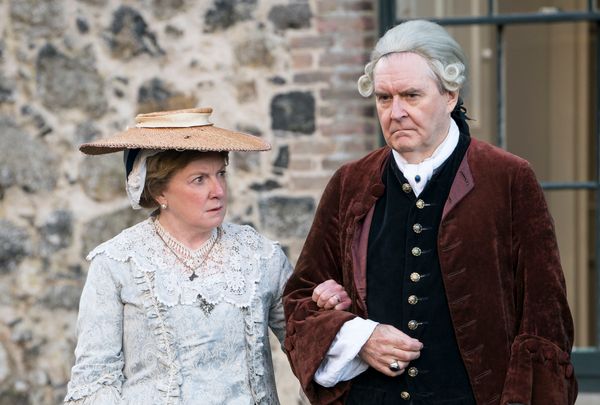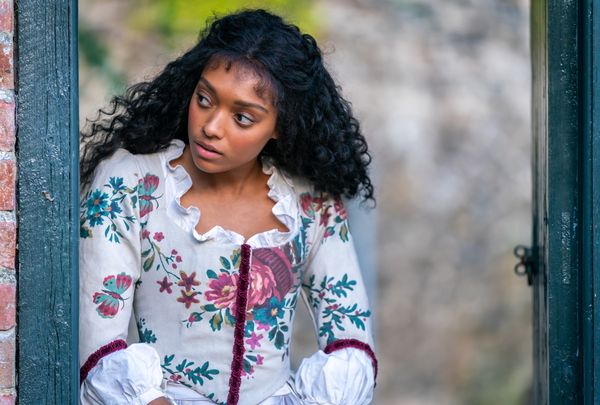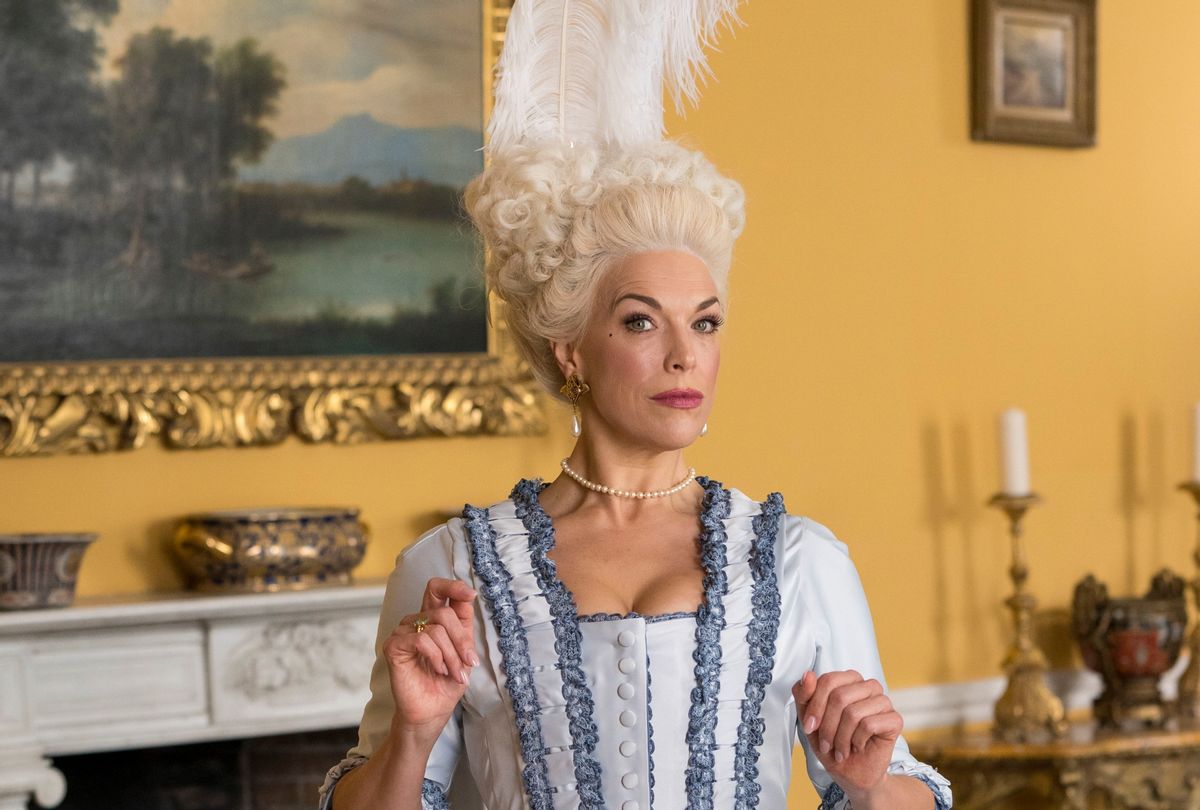"Silly old bat. She's well past the age of love."
In PBS' adaptation of Henry Fielding's 18th-century novel "Tom Jones," this heartless statement is uttered about Lady Bellaston (Hannah Waddingham), a wealthy older woman with whom Tom (Solly McLeod) is having a transactional affair. Tom's friend Nightingale (Will Fletcher) makes the declaration to rationalize a nasty letter they're about to send her in which Tom will declare his love and propose marriage.
This is not the romantic gesture it may seem, but rather a salvo to call her bluff. Lady Bellaston has been possessive of Tom's affections, to the point that he fears she'll expose their affair to his true love Sophia (Sophie Wilde). Nightingale believes this proposal will disgust Lady Bellaston, since it implies that Tom has only been sleeping with her in order to become her husband, which comes with the rights to control her money.
After receiving the letter, Lady Bellaston is indeed upset and breaks off her relationship with Tom. But it's not mere disgust, it's heartbreak.
"I see I have wasted my affection on a heartless joker," she tells him through tears. "Am I such a fool that I should deliver my entire fortune into your power? To call you husband and bow to your command? I know you now, Mr. Jones, as a worthless villain and I despise you from my soul."
McLeod broke down that scene for Salon.
"She's spoiled, rich, nasty, but ultimately still vulnerable to love and disappointment."
"That's almost the first point you see Lady Bellaston feel something," he said. "It kind of seems like she's been playing him a little bit, and the tables have turned. There's a vulnerability there, and Hannah does it so well. I didn't have to do much. I was like, she genuinely loves Tom, and I felt bad for her."
Clearly, women over a certain age are not past the age of love, much less desire or sex. And this is something that writer Gwyneth Hughes wanted to explore when it came to Lady Bellaston, a character who was treated with much less nuance and depth in the original text.
"Fielding thinks she's a silly old cow," Hughes told Salon. "Two things happened to her character in Fielding. One is she just disappeared in the end. There's no real ending to her story. And the other is that there's none of the sense of tragedy that I've tried to bring to it.
"I was writing a part for an older woman in love with a young man, and a lot of the audience are that age group and don't want to be told they're too old for love," Hughes continued. "So I really wanted to inhabit her properly and attract an actress with a character who is not a grotesque. She's spoiled, rich, nasty, but ultimately still vulnerable to love and disappointment. My Lady Bellaston, I wouldn't say she's a nicer but she's certainly more human than Fielding's."
Landing "Ted Lasso" star Hannah Waddingham was key to conveying this humanity.
"She's such a goddess," said Hughes. "I was thrilled when we got her because there are dozen actresses who can play these things but she's Lady Bellaston. She's not afraid to be grotesque, but she's also totally there for the the vulnerability and the and the rage."
There's no doubt in Hughes' mind that Lady Bellaston truly loves Tom, which explains the hurt reaction and her scheme to destroy his chances at happiness with Sophia.
"The thing about Tom is that he's completely authentic. He's a real person," said Hughes. "He's full of love. He's full of virtues. He's just a kind person, and he's really hot, obviously. She falls for him but she doesn't expect to do that. I believe that Lady Bellaston is really properly in love with Tom. Everything that she does is motivated by horror and grief and misery, and she behaves really badly, but she does really love him to the extent that she's capable of love."
Tom's two mothers
 Felicity Montagu and James Fleet as Bridget and Squire Allworthy in "Tom Jones" (PBS)For Lady Bellaston's revenge scheme, she holds a gathering at her home and makes a public spectacle of humiliating Sophia by showing her Tom's marriage proposal letter. In the ensuing chaos, Tom also gets pulled into a duel and impales another man, which sends him to prison. It's during this confinement that he discovers that Mrs. Waters (Susannah Fielding), the woman whom he slept with while on the road to London, is none other than Jenny Jones, the woman who claimed to have given birth to Tom 20 years ago.
Felicity Montagu and James Fleet as Bridget and Squire Allworthy in "Tom Jones" (PBS)For Lady Bellaston's revenge scheme, she holds a gathering at her home and makes a public spectacle of humiliating Sophia by showing her Tom's marriage proposal letter. In the ensuing chaos, Tom also gets pulled into a duel and impales another man, which sends him to prison. It's during this confinement that he discovers that Mrs. Waters (Susannah Fielding), the woman whom he slept with while on the road to London, is none other than Jenny Jones, the woman who claimed to have given birth to Tom 20 years ago.
Facing a possible hanging and believing that he has committed incest sends the usually sunny Tom to his nadir.
"He screams. It's the first time you see him angry and upset," said McLeod. " There's nothing worse than that. It shows Tom's willpower, in a way, because at that point, he's gone through all of this. He's trying to do things right. He keeps getting knocked down, keeps getting back up again. And it's at this point where you think, Oh, maybe he's not gonna make it?"
"That's the payback for being silly and getting in bed with these women back then."
Fortunately, this is not "Game of Thrones" or "House of the Dragon," and incest has not occurred. It turns out that Jenny was paid to lie about Tom's parentage in order to protect Bridget Allworthy (Felicity Montagu). As part of the gentry but unmarried, Bridget would have lost her reputation had the illegitimate birth been known then.
"I didn't know what to do," she tells Tom in the finale. "I couldn't tell anyone, an unmarried lady. What would the world have said?"
In adapting the novel, Hughes always knew she wanted to keep the incest scare intact.
"That's the payback for being silly and getting in bed with these women back then. In Fielding, it's very important that that will pay off. Actions have consequences," said Hughes. "It's a romantic comedy. I don't really mind if people laugh because in the end he gets a hug from his mom."
Speaking of, that hug certainly does not happen in the novel. In fact, Bridget isn't even around. She dies in the book.
Hughes explained, "My boss just rang me up one day and said, 'I know you're going to hate this. But do you think you can just let Bridget live?' He wanted Tom to have some closure and meet his mom, that the 'Masterpiece' audience were going to want him to meet his mom."
And in the end, while it's not Tom's fault, his birth is the catalyst for changing these two women's lives. Despite – or because of her status – Bridget is forced to give him up. While she is able to dote on him since her brother takes him in, she hadn't been to acknowledge his parentage, and this secret ultimately creates a toxic dynamic with her second-born son, the legitimate Blifil (James Wilbraham). Overcompensating for Tom's bastard status, she is overly warm to him and consistently neglects Blifil, which has caused him to grow up jealous and bitter.
"That's disgusting," Blifil tells Bridget upon finding out her secret. "Did you think I didn't know? I see it so clearly. You always loved him more than me. You're his family."
Meanwhile, Jenny may have temporarily benefitted for pretending to be his parent, but she was forced to leave home. All of these lives changed irrevocably because of the strict dictates of a patriarchal society that equates legitimacy with worth and morality.
Sophia wins in the end . . . or does she?
 Sophie Wilde as Sophia Western in "Tom Jones" (PBS)In a bid to diversify the casting – an effort seen across most Western television – Hughes race-bent the character Sophia to be a young Black woman, the child of Squire Western's (Alun Amstrong) son and one of his enslaved workers in Jamaica. It's a similar background to "Sanditon" heiress Georgiana Lambe (Crystal Clarke).
Sophie Wilde as Sophia Western in "Tom Jones" (PBS)In a bid to diversify the casting – an effort seen across most Western television – Hughes race-bent the character Sophia to be a young Black woman, the child of Squire Western's (Alun Amstrong) son and one of his enslaved workers in Jamaica. It's a similar background to "Sanditon" heiress Georgiana Lambe (Crystal Clarke).
"I did lots of research and found in Jamaica, these white British blokes would get these slave women pregnant and accept the children because they had no other children," said Hughes. "And there was one guy in particular who had nine children who sent them all back to England to be educated at vast expense, and those children inherited the estate.
"That's my story. That this this man, Squire Western who we meet had one son, who went to Jamaica to make his fortune, died of a tropical illness had sired this one child. She's the only heir he has, so he brings her home, raises her, educates her and makes her his heiress. So it works. It's true. It's historically plausible, and it did happen."
From the beginning, Hughes gives the onscreen Sophia a power that she does not have in the novel; she narrates the series. This power was not granted for feminist, modern motives, but rather from a filmmaking, storytelling perspective.
"Obviously it's called 'Tom Jones,' and it's basically about Tom's story. In a novel, you can have a character who bumbles about through life and to whom things happen. That's kind of interesting and jolly," said Hughes. "In film classically, that's not the way we do things. It's clear as day when you read the book. I thought that the person motivating the action, the central character in a moviemaker's terms, it's Sophia.
"Tom gets thrown out of his home – a passive throwing out of home – but she leaves hers," Hughes continued. "She leaves everything she's ever known. She's a young woman in great danger. She goes out into the world in pursuit of this unsuitable young man. She's the active character. I began to see that the driving energy, the driving sexual energy in the book comes from her. She's 18 years old and a virgin. Her awakening, if you like, sexual adulthood is motoring the entire story."
Despite not being buffeted around by the winds of fate as much as Tom is, Sophia is nevertheless a young, unmarried woman. That means for that era, virginity is her biggest asset, and that marriage is her ultimate goal.
Sophia's Aunt Western (Shirley Henderson), who is an independent unmarried woman, may rail about "the tyranny of idiot menfolk," but even she understands the world they live in. She helps to get Tom back – despite his sleeping with two other women after he had declared his love for Sophia – to marry her niece.
"Welcome to the 18th century," Hughes said. The writer may have been able to infuse a bit of the 21st century aesthetic to the story through casting and narration. However, the story's rom-com nature, and the realities of the time period dictated that her heroine take action to avoid two worst fates: spinsterhood or marrying Blifil against her will.
Despite making a half-hearted attempt at making Tom squirm, she gives into his marriage proposal because her grandfather orders her to marry. It's a shiny, happy ending for all the good folk in Somerset, but at the same time, while Sophia is in love with Tom, it's not entirely clear if her true desires are actually met or if she knew this was the best option open to her.
 Sophie Wilde and Solly McLeod as Sophia Western and Tom Jones in "Tom Jones" (PBS)After all, Tom had declared his everlasting love for her and then shortly afterward slept with two other women – one in the hotel room next door to hers, and one on an ongoing basis for money. Of course, he didn't need to be faithful after not being able to marry her, and he is only in his 20s, but the double standard is highlighted by his actions. His future is not ruined for these slips, but hers could be if the roles were reversed.
Sophie Wilde and Solly McLeod as Sophia Western and Tom Jones in "Tom Jones" (PBS)After all, Tom had declared his everlasting love for her and then shortly afterward slept with two other women – one in the hotel room next door to hers, and one on an ongoing basis for money. Of course, he didn't need to be faithful after not being able to marry her, and he is only in his 20s, but the double standard is highlighted by his actions. His future is not ruined for these slips, but hers could be if the roles were reversed.
Hughes acknowledges the ways the period drama glosses over the harsher realities. "You should never romanticize the past," she said. "The past is miserable. Women died constantly in childbirth, and we got the plague and slavery – it was horrible."
Want a daily wrap-up of all the news and commentary Salon has to offer? Subscribe to our morning newsletter, Crash Course.
However, the way that Tom and Sophia meet and have an instant attraction, that's something that Hughes believes is the true value of the time period and this story.
"One things I find charming about this story is that these young people can meet across a crowded stableyard or fall in love and off they go," she said. "In [that] age, there's no swiping, there's no internet dating. There's some agony about you don't want to get pregnant, about class and illness and all the terrible things that went on. But they had the chance of more instant human connection with each other. That human connection I think I really responded to."
"Tom Jones" is now streaming.
Read more
stories about "Masterpiece" series



Shares